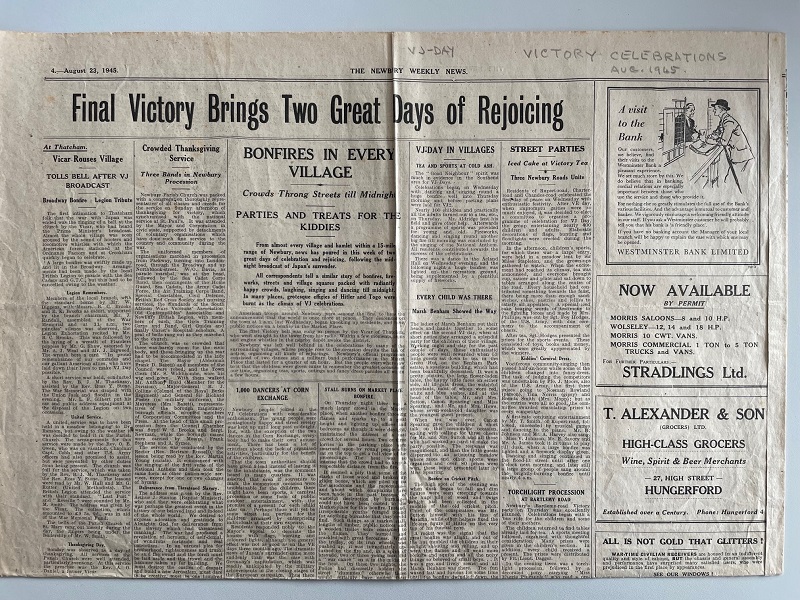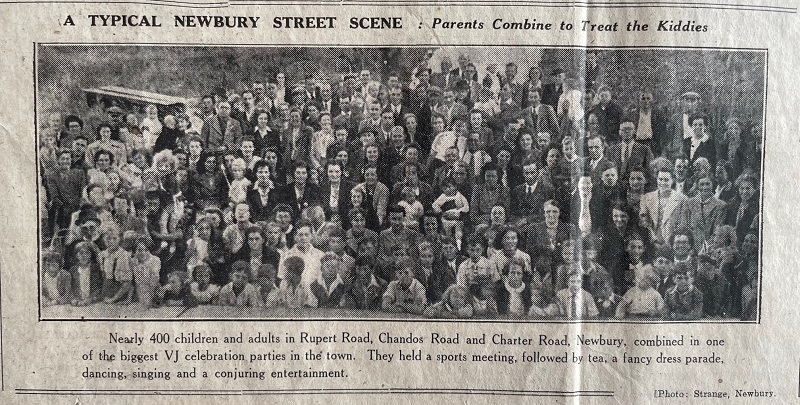The anniversary of VJ Day is celebrated annually in the UK on 15 August. On this date in 1945, Japan surrendered after several gruelling years of conflict which signalled the end of the Second World War. Records of this historic moment are surprisingly sparse in the BRO collections. By contrast, VE Day, the occasion on which victory was won in Europe, is well documented and details of large scale local VE Day events are easily found.
This newspaper article from the Newbury Weekly News, 23 August 1945, does survive in the collections (reference N/D110/1/1-9). This describes VJ Day celebrations in the town and surrounding areas and it goes some way to explain why there may not be much documentation for such events.

The article explains that VE Day was well anticipated in advance, which was not the case for VJ Day. The report notes that ‘the dramatic news of Japan’s surrender came more suddenly than was the case with Germany’s capitulation, which was readily anticipated’. As a result, celebrations were ‘hastily arranged’ with many local councils leaving the bulk of the responsibility up to communities and individuals to arrange their own parties.
The official programme included two dances and a military band performance. It was reported that, ‘the dances which were arranged at short notice were exceedingly well patronised’. One particular dance drew over 1000 people which was ‘the largest number ever seen at a dance in the Corn Exchange’. Despite the short notice, ‘teas, sports, outings and fancy dress parades' were organised by local people 'within a few hours’. Attempts were made to bolster the events, and ‘residents responded nobly to the Mayor’s appeal to decorate the houses with flags, bunting and coloured lights, although the general effect was not as good as on the VE days three months ago’. Nevertheless, the lack of time to organise events did not hinder the joy of the occasion, and ‘the young people were contagiously happy and street revelry was kept up until long past midnight’.
Most of the events described in the newspaper focused on activities for children. A Victory tea was given for about 60 children of Monks’ Lane, Newbury. After the tea, the children were given a shilling each and a bag of sweets. There were games and races, with the winners even receiving cash prizes. This photograph printed with the report shows residents of Rupert Road, Chandos Road and Charter Road. Over 400 children and adults attended, and ‘everyone brought cup, saucer and plate and sat down to tables arranged along the centre of the road’. Each household contributed to the feast and a ‘special iced cake bearing words of testimony to the fighting forces’ was served. There was ‘vociferous community singing’, a children’s fancy dress parade and a ‘conjuring entertainment’.

This report has been able to fill in some gaps in our understanding of the events that took place to mark this momentous occasion. Archives typically hold primary, unique sources which document historic moments. However, secondary sources, such as newspapers, can add a wealth of detailed information that may not be findable elsewhere.
The newspaper gives us an intimate glimpse into how local people initially heard the news of VJ Day. For Thatcham’s residents, their first indication of victory was the tolling of the church bells - the Vicar having gone 'straight to the tower from his radio’. There were American soldiers stationed nearby who sounded hooters and locomotive whistles.
VE Day in May is often remembered as the date that victory was won. However, for many soldiers fighting overseas, the conflict did not end until VJ Day in August. For Prisoners of War, there were further delays still before they could embark on the long journey home.
In an article in The Reading Standard (23 November 1945), found on the British Newspaper Archive, VJ Day celebrations were delayed in Woodwaye, Woodley, until November. This was to coincide with the return of Mr Clements of 25 Woodwaye, who had been a Prisoner of War in Japan. A Christmas tree was installed, and as guest of honour, he handed out gifts and sweets to the children who lived in the street.
Although official records of VJ Day are not easily found, it is important to recognise the significance of this event and to look to secondary sources for the desired information.
Berkshire Family History Society examined the stories of two men from Purley who were Prisoners of War in Japan which can be read here. To find out more about the local perspective on the Second World War, please see our online exhibition, 'Through their Eyes' here.
